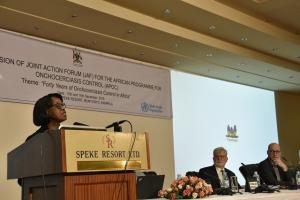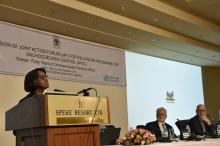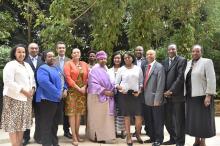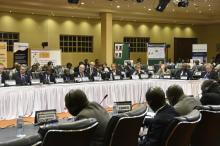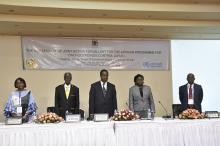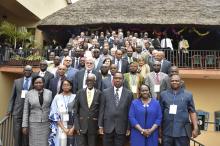The African Programme for Onchocerciasis Control (APOC) closes and a new body set up to eliminate Neglected Tropical Diseases
KAMPALA, 17 December 2015:- The African Programme for Onchocerciasis Control (APOC) founded in 1995 has been formally closed and a new entity – the Expanded Special Project for the Elimination of Neglected Tropical Diseases (ESPEN), with an expanded mandate, proposed to replace it. ESPEN was formally introduced to delegates at the 21st session of the Joint Action Forum (JAF) of the African Programme for Onchocerciasis Control (APOC) that has concluded in Kampala, Uganda.
APOC has played a critical role in the control of river blindness especially in the 16 onchocerciasis-endemic countries in Africa. However, moving forward, health experts suggest that expanding its role to take on Neglected Tropical Diseases (NTDs) is more relevant to the African region. This means that in addition to working towards elimination of Onchocerciasis, ESPEN will also focus on accelerated reduction and elimination of NTDs, such as Lymphatic Filariasis, Schistosomiasis, Soil-transmitted Helminthiasis and trachoma from the WHO Africa region by 2020. ESPEN will function as the technical arm of the WHO Regional NTD Programme.
The 21st JAF under the theme ‘Forty Years of Onchocerciasis Control in Africa’ was opened by Uganda’s 3rd Deputy Prime Minister Hon. Al Hajji Kirunda Kiveinja who highlighted the critical need to eliminate NTDs in Africa. He noted that most of the Millennium Development Goals (MDGs) and the new Sustainable Development Goals (SDGs) are linked to health and agriculture which if properly implemented will lead to better workforce and hence improved standards of living in Africa.
The WHO Regional Director for African Dr. Matshidisho Moeti appreciated the high quality of technical presentations and discussions at the meeting adding that this had adequately prepared WHO to properly administer ESPEN which will start operations in January 2016 under WHO.
“We recognize the need to start the south-south collaboration in addressing NTDs as suggested by the donors, and I encourage countries to consider it,” Dr Moeti said. She emphasized that “NTDs will continue to be on top of our agenda” and she reiterated WHO’s commitment to tackling them”.
Dr Moeti assured the delegates that WHO will manage the transition from APOC to ESPEN carefully in close consultation with partners and will develop a plan for the transfer, storage and accessibility by countries and partners to information and data currently available at APOC.
The representative of donors Dr. Adrian Hopkins recommended the transfer of available funds from APOC to the WHO Regional Office to facilitate the transition to ESPEN. The donors further recommended that APOC’s movable and other assets be donated to countries, WHO Country Offices and the Regional Office.
Overall, the 21st JAF commended APOC Management, Technical Consultative Committee and the Non-Governmental Development Organizations (NGDOs) for the excellent work they have done since its inception. Particular mention was made of the APOC Evaluation Team for an in-depth, comprehensive and thoughtful report and the WHO Regional Director for the assurances given on the way forward.
The 21st JAF was attended by Honourable Ministers or their representatives from the 16 Onchocerciasis-endemic countries in Africa, representatives of the donor community, the World Bank, the African Development Bank, senior health managers, Non-Governmental Development Organizations (NDGO), the Mectizan Donation Programme, Research Institutions, Directors and Coordinators of National Onchocerciasis Control Programmes, representatives of the Statutory Bodies of APOC and WHO staff from headquarters, regional and the Country Office.
________________________________________________
For more information, please contact:
Dr Chris Mwikisa, APOC Director(ai); Tel: +26650342959; Email: mwikisac [at] who.int (mwikisac[at]who[dot]int)
Collins Boakye-Agyemang, Regional Communications Adviser; Tel: + 242 06 520 6565; Email: boakyeagyemangc [at] who.int (boakyeagyemangc[at]who[dot]int)
Benjamin Sensasi, WHO/Uganda Communications Officer Tel: +256 772507906; Email: sensasib [at] who.int (sensasib[at]who[dot]int)
________________________________________________
Below:
01. WHO Regional Director Dr. Matshidisho Moeti speaks at the closure of JAF21
02. WHO Regional Director in a group photo with the United Nations Country Team
03. A cross section of the participants at JAF21
04. Left to Right Dr. Matshidisho Moeti, 3rd Deputy Prime Minister Hon. AlHajji Kirunda Kiveijinja, Minister of Health Hon. Dr. Elioda Tumwesigye, Minister of State for Health in Charge of Primary Health Care Hon. Sarah Opendi
05. A group photo of the delegates that attended JAF21



